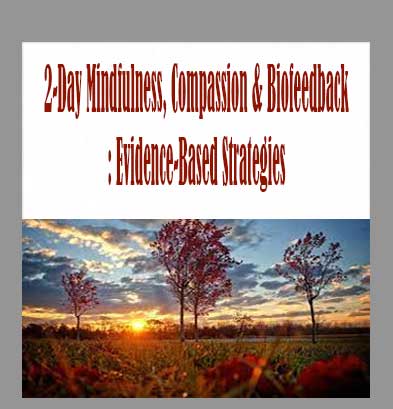2-Day Mindfulness, Compassion & Biofeedback: Evidence-Based Strategies to Improve Self-Regulation & Stress Reduction in Clients with PTSD, Anxiety, Chronic Pain & More
Description
2-Day Mindfulness, Compassion & Biofeedback: Evidence-Based Strategies to Improve Self-Regulation & Stress Reduction in Clients with PTSD, Anxiety, Chronic Pain & More download, 2-Day Mindfulness, Compassion & Biofeedback: Evidence-Based Strategies to Improve Self-Regulation & Stress Reduction in Clients with PTSD, Anxiety, Chronic Pain & More review, 2-Day Mindfulness, Compassion & Biofeedback: Evidence-Based Strategies to Improve Self-Regulation & Stress Reduction in Clients with PTSD, Anxiety, Chronic Pain & More free
2-Day Mindfulness, Compassion & Biofeedback: Evidence-Based Strategies to Improve Self-Regulation & Stress Reduction in Clients with PTSD, Anxiety, Chronic Pain & More
Clients with PTSD, anxiety, depression or chronic pain often struggle with distress-tolerance and poor emotional regulation. These clients are often unable to cope with navigating through difficult treatment because they can’t access thoughts and feelings beyond the immediate moment.
Week after week, this leaves you feeling like you’re having the same session repeatedly with no improvements. You’ve become frustrated and are not sure what to do next.
Transform your clinical outcomes by integrating Mindfulness-Based Biofeedback into your practice!
Mindfulness-Based Biofeedback can complement any treatment approach and has been demonstrated to improve numerous physical and emotional health symptoms including those associated with chronic pain, anxiety, stress and depression.
In biofeedback treatment, individuals learn about their emotional state by taking biological measurements, such as temperature or respiration rate, and use that information to choose mindfulness and compassion techniques to target and change symptoms of high stress or dysregulation.
You’ll be able to teach these skills to your clients so that they can become aware of their bodies and “see” their mood states, emotions and stress levels – with little to no financial investment required.
Watch Dr. Urszula Klich, PhD, BCB, and discover the exponential benefits of combining two rigorously studied scientific methodologies into a modality that is useful for clinical practice and overall health and wellbeing. Dr. Klich will walk you step-by-step through the process of using biofeedback and mindfulness together with the goal of helping your clients develop stress-reduction and self-regulation skills.
You’ll learn how to utilize affordable, easy-to-use, portable biofeedback modalities in session and how to teach your clients to use them at home.
Watch this hands-on, experiential recording, and you’ll leave with valuable skills and tools that you can apply immediately to transform your practice.
Speaker
Urszula Klich, PhD, BCB
My Mindful Way of Life, llc
Dr. Urszula Klich, Ph.D, BCB, is a clinical psychologist, speaker, and author who teaches self-regulation to maximize physical and emotional health. She is a certified meditation teacher in Cognitively-Based Compassion Training (CBCT) through Emory University and has served on various medical teams.
She is board certified in biofeedback and is the president of the Southeast Biofeedback and Clinical Neuroscience Association. Her specialized program of Mindfulness-Based Biofeedback (MBB) has been published and widely applied from hospitals to classrooms based on the premise that integrating mindfulness and compassion-informed treatment with psychology fosters individuals’ healing power to improve physical, emotional, and spiritual well-being.
Living mindfully is advantageous and accessible to anyone who recognizes a need for a shift in their lives and sets an intention to move forward. She is a sought-after workshop leader and internationally recognized speaker in health and wellness.
Speaker Disclosure:
Financial: Urszula Klich maintains a private practice. She receives a speaking honorarium from PESI, Inc. She has no relevant financial relationships with ineligible organizations.
Non-financial: Urszula Klich is president of the Southeast Biofeedback and Clinical Neuroscience Association.
Objectives
- Explore the physical and psychological benefits of mindfulness meditation and their treatment implications.
- Articulate the efficacy of practicing mindfulness-based approaches as it relates to symptom reduction for several disorders, including anxiety and chronic pain.
- Integrate mindfulness and compassion-based interventions in session to improve clinical outcomes.
- Assess nervous system reactivity in clients with an individualized stress test to inform clinical treatment interventions.
- Analyze biofeedback treatment and provide examples of biofeedback modalities that are amenable to practical use by clients and in session.
- Perform a clinical assessment to inform the clinician’s choice of the best combination of mindfulness and biofeedback modalities for symptom management.
- Explain how mindfulness-based biofeedback treatment works to alleviate psychophysiological symptoms that occur because of acute and chronic stress.
- Integrate biofeedback with complementary relaxation techniques to improve clinical outcomes.
- Develop a mindfulness-based biofeedback treatment plan to alleviate symptoms of stress, pain, anxiety, PTSD, and depression in clients.
- Utilize respiration and thermal biofeedback modalities in session to teach clients self-regulation skills and stress management.
- Integrate biofeedback and self-regulation exercises, such as compassionate bodily awareness, in session, to improve client level of functioning.
- Utilize clinical strategies to adapt mindfulness-based biofeedback to treat various client populations, such as children and military personnel.
Outline
Integrate Biofeedback into Your Practice
- Biofeedback purpose and benefits
- Assess client reactivity
- Efficacy for various mental health conditions
- What happens when clients try to relax
- Stress & it’s relationship to pain
- How biofeedback works
- Choose the right tool for the job
- Usability and portability considerations
- Treatment goals
- Billing & documentation considerations
- Limitations of research & potential risks
- Practice Exercises: Using different biofeedback modalities
Respiration Biofeedback: Step-by-Step
- Meditation & the breath
- Assess dysfunctional breathing
- Symptoms of overbreathing
- Overbreathing & mental health
- Biofeedback modalities for breathing regulation
- Apps for use with respiration biofeedback
- Overcome barriers to improvement
- Practice Exercise: Respiration biofeedback
Thermal Biofeedback: Step-by-Step
- Symptoms of vasoconstriction
- Thermal biofeedback modalities
- Use thermal biofeedback to reduce level of arousal
- Teach clients to regulate temperature
- Integrate autogenic training & thermal biofeedback
- Practice Exercise: Hand temperature
Mindfulness & Compassion: Essential Skills for Use with Biofeedback
- Strategies to improve client engagement
- Promote psychological flexibility and adaptive functioning
- Autogenic training: Step-by-step
- Cognitively-Based compassion training
- Practice Exercise: Mindfulness & compassion
Mindfulness-Based Biofeedback Step-by-Step: Boost Clinical Effectiveness by Combining Mindfulness and Biofeedback
- Integrate physical, cognitive & emotional well-being
- When to use mindfulness-based biofeedback
- Assess client nervous system reactivity
- Biofeedback-driven goals
- ”Activate” the parasympathetic nervous system
- Help clients explore their values
- Take a strengths inventory
- Complementary relaxation techniques
- Utilize the MBB Cognitive Awareness Log
- Biofeedback-assisted body scan
- Barriers to mindfulness-based biofeedback
- Practice Exercises: Mindfulness-based biofeedback techniques
Mindfulness-Based Biofeedback for Skills Development
- Choose the best combination of mindfulness practices & biofeedback modalities
- What to monitor & when
- Take-home worksheet resources
- Help clients transition behaviors into habits
- Relapse or normal fluctuations in learning?
- Client homework: Simple starting points
- Practice Exercises: Use biofeedback for skills development
- Attention & prevention
- Distraction
- Thought management
- Awareness
- Problem reconceptualization
- Tension reduction
- Self-regulation
Mindfulness-Based Biofeedback in Action: Confidently Tailor for Use with Specific Disorders & Special Clinical Populations
- PTSD
- Anxiety and panic
- Depression
- Chronic & acute pain
- Headaches
- Military
- Couples
- Children
Target Audience
- Counselors
- Psychologists
- Case Managers
- Psychotherapists
- Social Workers
- Marriage & Family Therapists
- Addiction Counselors
- Therapists
- Nurses
- Occupational Therapists
- Occupational Therapy Assistants
- Other Mental Health Professionals
Frequently Asked Questions:
- Innovative Business Model:
- Embrace the reality of a genuine business! Our approach involves forming a group buy, where we collectively share the costs among members. Using these funds, we purchase sought-after courses from sale pages and make them accessible to individuals facing financial constraints. Despite potential reservations from the authors, our customers appreciate the affordability and accessibility we provide.
- The Legal Landscape: Yes and No:
- The legality of our operations falls into a gray area. While we lack explicit approval from the course authors for resale, there’s a technicality at play. When procuring the course, the author didn’t specify any restrictions on resale. This legal nuance presents both an opportunity for us and a boon for those seeking budget-friendly access.
- Quality Assurance: Unveiling the Real Deal:
- Delving into the heart of the matter – quality. Acquiring the course directly from the sale page ensures that all documents and materials are identical to those obtained through conventional means. However, our differentiator lies in going beyond personal study; we take an extra step by reselling. It’s important to note that we are not the official course providers, meaning certain premium services aren’t included in our package:
- No coaching calls or scheduled sessions with the author.
- No access to the author’s private Facebook group or web portal.
- No entry to the author’s exclusive membership forum.
- No direct email support from the author or their team.
We operate independently, aiming to bridge the affordability gap without the additional services offered by official course channels. Your understanding of our unique approach is greatly appreciated.
- Delving into the heart of the matter – quality. Acquiring the course directly from the sale page ensures that all documents and materials are identical to those obtained through conventional means. However, our differentiator lies in going beyond personal study; we take an extra step by reselling. It’s important to note that we are not the official course providers, meaning certain premium services aren’t included in our package:
Refund is acceptable:
- Firstly, item is not as explained
- Secondly, Item do not work the way it should.
- Thirdly, and most importantly, support extension can not be used.
Thank you for choosing us! We’re so happy that you feel comfortable enough with us to forward your business here.









Reviews
There are no reviews yet.